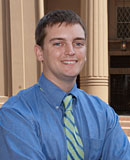
M.D./Ph.D. Candidate Presents Research in Japan
By Isshin Teshima
David Gibb’s research began as an attempt to understand allergies and ended up explaining a key element of cancer.
An M.D./Ph.D. candidate in the School of Medicine, Gibb’s research focuses on the enzyme ADAM10, which has several different roles, including regulating the formation of antibodies that promote allergic reactions.
At the microscopic level, different elements can often be responsible for several different functions, said Gibb. In Gibb’s case, ADAM10 also was responsible for the control of the differentiation of hematopoietic stem cells — the precursor to white and red blood cells.
Gibb’s research concluded that too little ADAM10 in tests meant that these stem cells would not develop into important antibody-producing cells, resulting in a highly weakened immune system. Too much of the gene and the cells would develop into myeloid cells, influential in the development of cancer.
“Researchers have labeled this enzyme as a target in cancer therapy, and many have been interested in blocking ADAM10,” said Gibb. “They will have to be aware of some of the consequences of those actions which may or may not be beneficial.”
His findings were published in a paper in the March 2010 issue of the Journal of Experimental Medicine. And in August, Gibb presented his findings at two conferences in Japan, including the 14th International Congress on Immunology. Gibb’s academic adviser, Daniel Conrad, Ph.D., professor of microbiology and immunology, says that “David has demonstrated the ability to both do his own studies and make collaborative contacts with other laboratories, here in the United States as well as in other countries.”
In addition to being invited to present his research, Gibb was also awarded a travel grant. “Travel awards and speaking invitations mostly go to postdoctoral or junior faculty candidates,” said Conrad. “It is a measure of the importance of the studies that has resulted in both the travel awards as well as the invitations to present.”